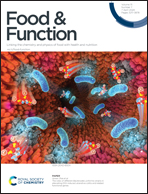Maillard-type glycated collagen with alginate oligosaccharide suppresses inflammation and oxidative stress by attenuating the expression of LPS receptors Tlr4 and Cd14 in macrophages†
Abstract
Inflammation and oxidative stress contribute to noncommunicable diseases (NCDs), with macrophages playing pivotal roles. Glycated collagen through Maillard-type glycation holds promise for enhancing anti-inflammatory properties, but its mechanism remains unclear. This study investigates the cellular mechanism and aims to contribute to expanding collagen utilization. Collagen was glycated with alginate oligosaccharide (AO) and glucose (Glc: as a comparative case) at 60 °C and 35% relative humidity for up to 24 h (C-AO and C-Glc, respectively). The anti-inflammatory activities of both C-AO and C-Glc were evaluated using an LPS-stimulated macrophage model. 18 h AO-glycated collagen (C-AO18 h) was found to significantly reduce the production of nitric oxide and proinflammatory cytokines (TNF-α), interleukin-6 (IL-6), and interleukin-1β (IL-1β). In contrast, C-Glc did not exhibit enhanced anti-inflammatory activity during any of the glycation periods. The enhanced anti-inflammatory activity of C-AO18 h was attributed to its downregulating effect on LPS receptors (toll-like receptor 4, Tlr4; cluster of differentiation 14, Cd14) and myeloid differentiation primary response 88 (Myd88) mRNA expression, with suppression in receptor expression resulting in decreased phagocytic ability of macrophages against E. coli. In addition, compared with intact collagen, C-AO18 h exhibited improved antioxidant activity in the LPS-stimulated macrophage model, as it significantly upregulated superoxide dismutase (SOD) and catalase (CAT) activities while reducing malondialdehyde (MDA) levels. Overall, this study contributes to the development of collagen-based functional foods for mitigating inflammation and oxidative stress in NCDs.



 Please wait while we load your content...
Please wait while we load your content...